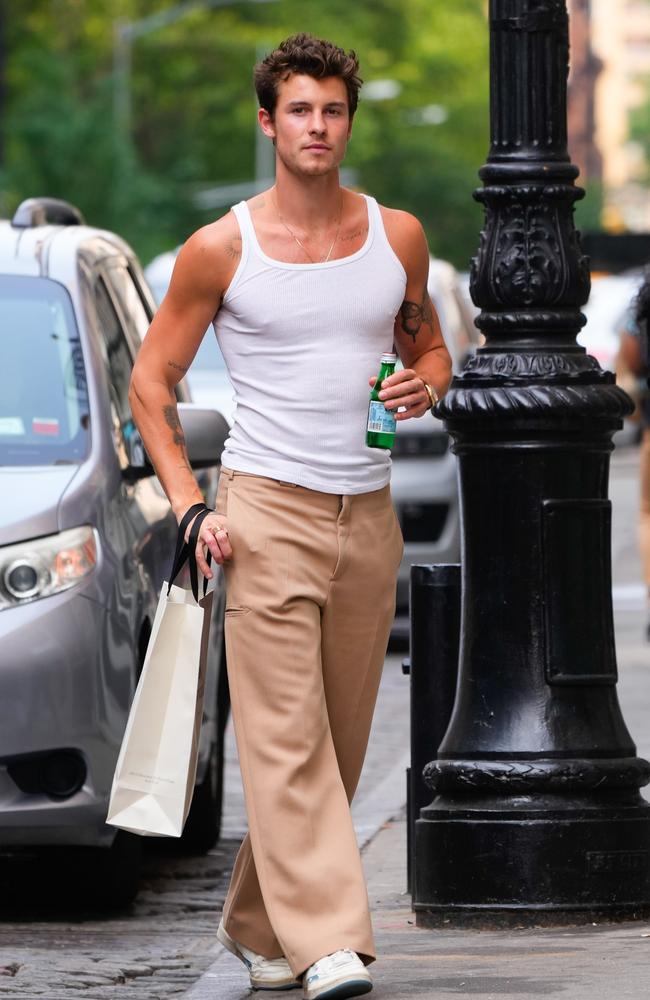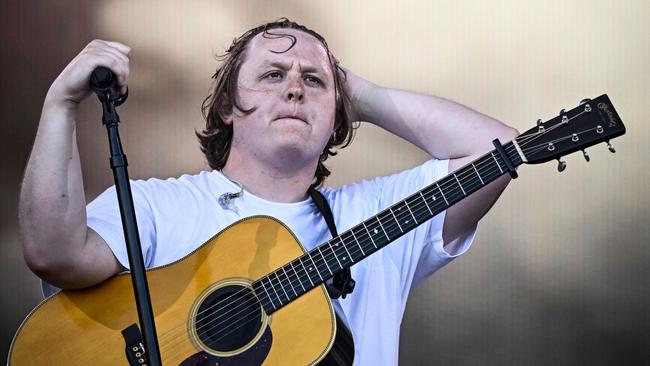Music industry grapples with mental health crisis as more artists cancel tours
Lewis Capaldi is the latest in a wave of music stars cancelling tours to deal with the mental health challenges of touring. Kathy McCabe looks at how the ‘show must go on’ mantra has shifted.
Psychologists, AA meetings and juice machines and fresh vegetables and fruit instead of fridges full of alcohol and tables groaning with fried food are the new normal on backstage riders as pop stars combat mental health challenges on tour.
Lewis Capaldi, Shawn Mendes and Justin Bieber are among a raft of younger superstars who have shared crippling battles with burnout which has forced them to cancel shows.
Their public declarations underscore how “the show must go on” mantra, which forced ill stars to forge ahead with two-years long world tours to avoid financial disaster, has shifted in recent years.

Scottish singer songwriter Capaldi this week announced he was quitting touring for the “foreseeable future” after he struggled with his vocals and Tourette’s tics during his performance at the Glastonbury festival last weekend.
The 26-year-old pop star was due to kick off a sold-out Australian arena tour next week ahead of headlining the Splendour in the Grass festival in Byron Bay.
In his How I’m Feeling Now documentary released this year, Capaldi shared how he suffered panic attacks on stage after he catapulted to success with his breakthrough single Someone You Loved, the fourth most streamed song of all time on Spotify.
He then developed painful twitches and tics which were diagnosed as Tourette syndrome last year.

The artist cancelled three weeks’ worth of gigs in May to rest up for his big Glastonbury moment. But as he pulled the pin on the rest of this year’s scheduled shows, Capaldi shared he was still trying to navigate life as a performer and recording artist with a neurological disorder.
“I used to be able to enjoy every second of shows like this and I’d hoped three weeks away would sort me out,” he wrote.
“But the truth is I’m still learning to adjust to the impact of my Tourette’s and on Saturday it became obvious that I need to spend much more time getting my mental and physical health in order, so I can keep doing everything I love for a long time to come.”
Australian guitar prodigy Nathan Cavaleri had four years off stage after he was stricken by panic attacks on tour.
It took a lot of work with psychologists, meditation coaches, nutritionists and other specialists to become strong enough to return to touring as he releases his new record aptly titled Miracles.

Cavaleri identified his performance anxiety was partly due to the trauma of battling childhood leukaemia in the public eye from the age of six. Getting on stage and playing was his escape, something to look forward to while enduring chemo treatments and lumbar punches.
A huge proportion of songwriters and performers have a history of childhood trauma; music gives them a creative outlet to express their pain but not the tools to deal with its causes.
“I grew up touring when I had chemo so I was very ill during that time that most people saw me on TV,” Cavaleri said.
“What would my life have been without that? It just would have been school and lumbar punches and nothing to look forward to. Playing gave me purpose, this drive that I just had to get through this shit so I could get up on stage.”

But that purpose came to a crashing halt when he suffered an onstage panic attack at the Queenscliff Music Festival.
He had been suffering anxiety and depression, surviving on zero to three hours sleep a night, poor eating habits and a constant whirr of noise in his head.
“My wife Amy was doing backing vocals at the time and I told her just before going on stage that I was freaking out, I felt out of my body and all this confusion,” he recalls.

“The adrenaline kicked in as I walked on stage, I got through six or seven songs and then I hit a big note and the world just spun around me and I had a mini blackout on stage and collapsed. When I came to I had this anxiety attack on stage and was trying to hide it behind my guitar. That’s when I lost that feeling of invincibility on stage.”
Cavaleri said it isn’t just artists who have to do the work on getting themselves well in the first place and become armed with tools to keep their mental and physical health in check.
A like-minded team is essential. He shares his experiences and information about various therapies with the tens of thousands of followers of his Twitch “hangs” which also featured him writing his new songs in real time.
He said four years away from performing was too long because it “created a huge mountain to climb to get back up there” and cancelling shows now was not an option for him.
Australia’s music industry charity Support Act has introduced a raft of programs and initiatives over the past five years to help artists and crew deal with mental health challenges in the short and long term.
There’s a Wellbeing Helpline for people to access in a crisis and Mental Health First Aid and suicide prevention training.

Support Act CEO Clive Miller is readying a new backstage wellness program called The Bunker where a social worker will be available to performers and crew for a mental health tune up or crisis assistance.
“I think the industry has always known touring can be a major trigger in relation to mental health for not only the artists but crew as well,” he said.
“That comes from people being away from home for extended periods of time, so much time travelling and not sleeping and maybe not eating well and always having to be on, as well as having to absorb all the stress that comes with a tour needing to be successful not only artistically but financially.”
Miller said more artists and managers were “taking agency” over their riders, replacing alcohol and fried food with healthier alternatives and scheduling eight hours of rest after a gig before hitting the road again with two week or more breaks between each leg of a tour.
“You see it more and more now that artists are approaching tours as an athlete would, trying to maintain ultimate fitness and be matchfit to do what they need to do every day.”
For all details of Nathan Cavaleri’s tour which opens on July 7 https://www.nathancavaleri.com/tour
More Coverage
Originally published as Music industry grapples with mental health crisis as more artists cancel tours





